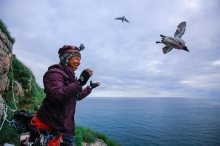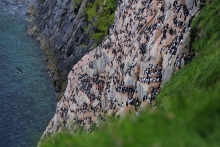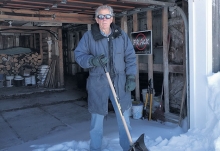Emily Choy [Post Doctoral Fellow, NRS. Advisor : Kyle Elliott] became hooked on the Arctic when, as a Master’s student, she jumped on a research opportunity to study the effects of manmade contaminants on High Arctic food webs on Devon Island, Nunavut. “When I experienced how out of the world it was and observed the wildlife that are so highly adapted to the Arctic environment, I just fell in love,” says Choy.

[Natural Resource Sciences professor Kyle Elliott, Canada Research Chair in Arctic Ecology, and grad students Allison Patterson and Don-Jean Leandri-Breton are co-authors on this study]
[Co-author Joshua Sterlin is a PhD student in the Department of Natural Resource Sciences at McGill University.]
An increase in cutting in Quebec’s public forests would be a mistake for the forests, the industry, the climate and the regions.
A recent opinion article in the Montreal Gazette (“Shortfall in forest harvest is costly to economy” Oct. 29) called on governments and logging companies to work together to increase cutting in Quebec.

While the world has been locked down for much of the spring and summer, airplanes have been grounded, fishing fleets have sat mostly idle and cars have stayed parked in their driveway as people worked from home. What kind of impact has this had on the environment? And what lessons have we learned from the relatively quick pivot governments and citizens have made to combat the spread of COVID-19? Can we apply the same commitment and speed of mobilization to pressing issues like climate change?

OpEd by Tom Mulcair, former the leader of the New Democratic Party of Canada (2012-2017).
Fifty years ago, Canada became a major, credible player in the world of environmental protection with the creation of our first department of the environment by former prime minister Pierre Trudeau. That move was accompanied by a progressive vision that was critical of the unbridled growth which showed no regard to the consequences for life on our planet.

McGill’s Elena Bennett wants you to imagine a radical, inspiring, and realistic future for our planet
When you think of the Earth 50 years from now, what do you see? Do you imagine desolate cities, scorched forests, dead oceans, lost biodiversity? Elena Bennett wants you to know the future doesn’t have to be bleak.

There’s less ice, more capelin and lots of hungry polar bears
Climate change in the eastern Arctic has already altered the travel, diet and safety of some of the most numerous birds in the circumpolar world: thick-billed murres, known as akpait in Inuktitut.
These and other changes are likely to continue, says Allison Patterson, a McGill University graduate student [with Professor Kyle Elliott] who has tracked the habits of these black-and-white birds on Hudson Bay’s Coats Island, known as Akpatordjuark in Inuktitut.
Indigenous Peoples around the world are suffering disproportionately from the impacts of pollution. After surveying close to 700 articles covering different disciplines and regions of the world, a research team led by Helsinki University and involving McGill has highlighted key factors that contribute to this situation.
Gus was born in Elrose, Saskatchewan and grew up on a farm where he acquired a life-long love for the land. He earned a BSc (Agr) and MSc at the University of Saskatchewan, and a PhD in soil chemistry from Cornell University. Gus spent the majority of his academic career at McGill University's Macdonald Campus where he pioneered fertility research in crop production, maximizing crop yield and the value of fertilizer management.
Every year, patches of Australian forests are consumed by fire, an ecologically necessary process that releases soil nutrients and stimulates plant growth. When the fire season is exacerbated by drought and high temperature, however, the devastation is so great that some citizens are forced to flee their homes. In the most extreme circumstances, natural habitats are ruined completely, even to the point of species extirpation.

« Je suis un gardien de la Terre, j’en prends soin. » C’est ainsi que Peter G. Brown, producteur forestier certifié et professeur à la Faculté des sciences de l’agriculture et de l’environnement de l’Université McGill, résume sa philosophie à l’égard de sa terre à bois d’environ 400 acres dans la municipalité de Franklin, en Montérégie.

Student researcher pieces together satellite data to help communities monitor wildfires
Morgan Crowley’s interest in sustainability took root early.
As a schoolchild in New Hampshire, she went to summer camp on Pine Mountain – so named for the stately evergreens that used to blanket the site. By the time Morgan started going there, “there were only two pines left” because the rest had fallen victim to a forest fire or to logging. As a result, “I grew up thinking very much about ecological sustainability.”

In the third installment of National Geographic’s “Into Water” 360 series, canoe through the sprawling Canadian wilderness with freshwater ecologist and National Geographic Explorer Dalal Hanna [Ph.D. candidate NRS (Bennett)]. She researches Quebec’s extensive freshwater systems, collecting samples from streams, rivers and lakes to assess ecosystem health, with the aim of protecting these precious resources. “Into Water: Canada” is the third stop on an around the world 360 tour that documents the work of female Explorers who’ve dedicated their careers to water related issues.
Scientists tackle the question of what kinds of life might reside now on the Red Planet, and how we might find it.
Last week NASA convened a visionary meeting in New Mexico to consider a topic critical to astrobiology—whether life currently exists on Mars, and if so, how to detect it. The site of the conference was near the world-renowned Carlsbad Caverns, which attendees got to visit during a mid-conference workshop.
Call for more relevant, solutions-focused research to address the social-ecological crisis
